Choosing the best salt for the dishwasher
It’s not enough to choose, purchase and install a dishwashing machine in the kitchen. In order for it to efficiently wash away food residues from cutlery, an automatic dishwasher needs detergents.
And if the water poured into it is also hard (high in calcium and magnesium), then you will need dishwasher salt of a special composition. Without this product, the dishwasher will not last long.
But what is it like and how to use it correctly? We will consider these questions in detail in our material. We have also highlighted the best options for effective salt.
Before purchasing, be sure to look at the PMM instructions. The section on the use of regulating salt may provide recommendations on the choice of release form of the composition.
The content of the article:
TOP 10 best salts for PMM
Finish
TOP-selling – pure granulated salt in large packaging
The ranking is topped by salt from the renowned manufacturer Finish. The company offers regenerating salt in different packaging.Packages of 1.5 kg and 3 kg are especially in demand. Smaller volumes are packaged in cardboard packs, while a three-kilogram pack is packaged in soft packaging.
Finish salt is produced in the form of large granules, so its consumption is quite economical.
General characteristics:
- type – large granules;
- composition – 99.99% salt;
- weight – 3 kg;
- the packaging is soft.
Finish salt effectively prevents the formation of plaque and protects expensive equipment from premature wear and breakdown. The dishes are washed well - no streaks remain.
It is convenient to pour large crystallized granules into the PMM cuvette; salt does not spill into the hopper.
- Economical consumption - large granules
- Storage duration – 2 years
- Pure composition – 99.99% salt
- Good water softening
- Rinses off without residue
- Inconvenient package
Bio Mio Bio-Salt
Eco-product - universal salt for different PMMs
One of the leaders in the production of environmentally friendly household chemicals offers effective salt. Bio-Salt softens water of various qualities and improves the effect of detergents.
The package contains snow-white, odorless granules. The bag has a zipper, so the salt does not cake and does not absorb moisture from the room. Its shelf life is 2 years.
General characteristics:
- type – granules;
- composition – 99.9% sodium chloride;
- weight – 1 kg;
- packaging – soft bag with a zip fastener.
The approximate consumption of Bio-Salt is 1 package for 35 washing cycles. However, the frequency of refilling the PMM will largely depend on the hardness of the tap water.
Bio Mio salt can be recommended to families with children and people prone to allergic reactions. After using it, there is no residue or foreign smell on the dishes.
- No fragrances or synthetic additives
- Convenient ziplock bag
- Environmentally friendly
- Leaves no streaks
- Large granules
- More expensive than analogues
- Small packaging volume
Clean&Fresh
Salt granules for PMM with antibacterial effect
Third place in the ranking is given to budget salt. Clean&Fresh is also available in the form of granules, so it is suitable for use in PMMs from different manufacturers. Large crystals do not have a specific odor.
General characteristics:
- type – granules;
- composition – 99.7% sodium chloride;
- weight – 1.8 kg;
- packaging – cardboard box.
The weak point of Clean&Fresh is its ill-conceived packaging. It is inconvenient to pour salt from a torn pack into a cuvette; the packaging itself is not airtight. After opening it, moisture may be absorbed into the salt, so it is better to provide another storage container.
Inconvenience of use is the price to pay for the modest price tag. Clean&Fresh copes well with the main tasks of regenerating salt.
- Affordability
- Large crystals - economical consumption
- Completely washed out - no residue
- Effective water softening
- No foreign smell
- The packaging is not sealed
- Pure salt 99.7%
Somat
Effective finely ground regenerating salt
Many housewives trust Somat products to ensure the performance of their dishwashers. Many buyers have appreciated the effectiveness of salt.
A distinctive feature of the product is its fine grinding. The salt quickly dissolves and goes to work; after washing, no residue remains on glasses, cups and other utensils.
General characteristics:
- type – powder;
- composition – sodium chloride;
- weight – 1.5 kg;
- packaging – cardboard box.
Powdered salt is suitable for hard tap water; its use is acceptable in different PMM models.
If the correct storage conditions are organized (dry place, temperature from +5°C), Somat salt will retain its qualities for 3 years.
The cardboard packaging is not made well - fine salt can spill out through the cracks.
- Good water softening
- Washable and leaves no streaks
- Storage duration
- Prevents the appearance of limescale
- Increased consumption
- Salt spills through the cracks of the packaging
Eonite
Domestic granulated salt
A worthy place in the TOP 10 best salts for dishwashers is occupied by a domestic product.
Large granules consist of 99.9% sodium chloride; the product contains no flavors, dyes, or other additives. Salt crystals completely dissolve without leaving stains on the dishes.
General characteristics:
- type – granules;
- composition – 99.9% sodium chloride;
- weight – 1.5 kg;
- packaging – cardboard box and plastic bag.
Eonit salt is supplied in double packaging - the granules are in a plastic bag with a zipper. The package itself is placed in a cardboard box.
- Pure composition – 99.9% sodium chloride
- Soluble in water
- Effectively protects the dishwasher
- Large granules
- Double packaging - there is a bag with a zip lock
- Inconvenient adding salt
- Over time it may become confusing
Synergetic
Salt for highly purified PMM
Synergetic finely ground salt is designed to soften water and prevent the appearance of deposits in PMM of any brand.
The powder is packaged in high-quality packaging - thick cardboard does not tear during use.
General characteristics:
- type – powder;
- composition – 99.5% sodium chloride;
- weight – 0.75 kg;
- packaging – cardboard box.
The tool effectively performs its assigned task. The main complaints are related to the powdered form of salt - it is inconvenient to pour it, and the consumption, compared to granulated salt, is higher.
- Pure composition – 99.5% salt
- No specific smell
- Product resistance to sub-zero temperatures
- Completely washable with water
- Suitable for children's dishes
- Light packaging weight
- Fine grind
Molecola
Tablet salt from a Russian brand of environmentally friendly household chemicals
Easy to use tablets - this salt can be easily poured into the PMM. The consumption of Molecola is economical.
The regenerating salt contains 99.81% sodium chloride. There are practically no impurities in the salt; the product supports the operation of the dishwasher’s ion exchanger.
General characteristics:
- type - tablets;
- composition – 99.81% sodium chloride;
- weight – 2 kg;
- packaging – plastic box.
The tableted salt is placed in a plastic container with a lid and a carrying handle.
- Sealed and large packaging
- Convenient filling into a ditch
- Pure composition without impurities
- Completely soluble in water
- Costs more than analogues
- The tablets are crumbling
Paclan Brileo
Granular universal salt for different brands of dishwashers
Paclan Brileo salt is packaged in 1 kg packs. The granules are quite large, but at the same time, the product dissolves well in water. It is easy to pour salt into the cuvette through a funnel.
The product copes with its tasks, preventing the formation of scale.
General characteristics:
- type – large granules;
- composition – sodium chloride;
- weight – 1 kg;
- packaging – cardboard packaging.
Paclan Brileo granular product is suitable for different brands of PMM.After using salt, no streaks remain on the dishes and there is no foreign smell.
- Homogeneous salt without impurities
- Large granules
- Salt has no smell
- Effective water softening
- Fragile packaging
- May cake over time
Lotta
Budget tableted salt for PMM
Lotta water softener tablets contain 99.7% sodium chloride. Salt effectively softens water and reduces the likelihood of deposits appearing on dishes and working components of the dishwasher.
General characteristics:
- type - tablets;
- composition – 99.7% sodium chloride;
- weight – 1 kg;
- packaging – cardboard box.
Lotta tableted salt takes a very long time to dissolve in some PMM models. Before purchasing such a product, you should read the instructions for the dishwasher. Some manufacturers do not recommend using salt in tablets.
- Convenient to pour into a ditch
- High-quality composition of tablets
- Affordability
- The dishes are clean
- Economical consumption
- Not suitable for all PMMs
- There may be plaque on the walls of the PMM
Top House
Highly purified coarse-crystalline regenerating salt
Top House products are famous for their quality, but their cost is higher than similar products from other manufacturers.
Salt is in the form of large crystals - their size is about 4-6 mm. The granules are odorless, do not crumble and are easy to use.
General characteristics:
- type – large granules;
- composition – sodium chloride;
- weight – 1.5 kg;
- packaging – cardboard box.
Top House salt is used economically, but the PMM may not be suitable for some models - it is not recognized, the indicators continue to notify about the need to add salt.
- Economical consumption
- Large crystals - easy to fall asleep
- Softening Hard Water
- High degree of purification
- High price
- Some PMMs do not perceive salt
Purpose of dishwasher salt
Regardless of the composition of the water, you cannot operate the dishwasher without salt. The equipment will turn on and work in any case, but it will not last long in this mode. Lime deposits will not immediately, but will inevitably lead to failure of the heating element inside. We recommend that you read operating rules dishwashers.
Do not confuse salt with detergent in “2 in 1”, “3 in 1”, “5 in 1” tablets, etc. Often the first is already contained in the second. However, this is far from a fact. Not all manufacturers add salt to their dishwasher soap.
Many of them make separate formulations - one for washing dishes, and the other for softening water. Everything is described in the labeling of the products and in the PMM instructions; it is worth studying this extremely important information.
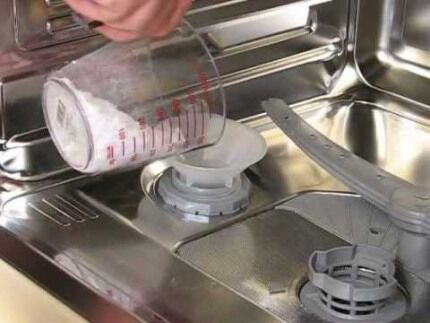
Dishwasher salt has several functions:
- softens the water used for washing;
- restores sodium reserves in the ion exchanger;
- relieves metal elements of washing equipment from scale (plaque);
- improves the quality of washing;
- protects the dishes, and therefore the person using them, from lime deposits.
All reasons for the need to use salt are in one way or another aimed at softening the water entering the machine. Filters can also be used for this purpose.However, they are expensive to install and operate, and do not always give the desired effect.
Salt tablets and powders have been specially developed for dishwashers to protect these appliances from excess calcium and/or magnesium in the water supply.
To fully understand why you need to use salt in the dishwasher, you need to familiarize yourself with design and operating principle dishwashers, and also delve a little deeper into chemistry. Thus, tap and well water contain a certain amount of ions of various metals and calcium. When heated, they fall out in the form of sediment, which gradually becomes compressed and creates scale.
The biggest problem with such “lime” is its buildup on the heating element heating the water.Similar growths form on electric heater tubes not only in dishwashers, but also in washing machines and boilers. As a result of scale build-up, first the heating element begins to spend more electricity to heat the water, and then at some point the coil in it burns out due to too high a temperature.
If you have a Bosch brand dishwasher and you need to replace the heating element, we recommend that you look detailed instructions by choice and replacement.
To avoid such problems, manufacturers of household dishwashers began to install a special ion exchanger in them. The resin in it, consisting of sodium chloride, binds metal ions and prevents them from combining with each other to form limescale. This is how everything unnecessary is discharged into the sewer, and the water is softened.
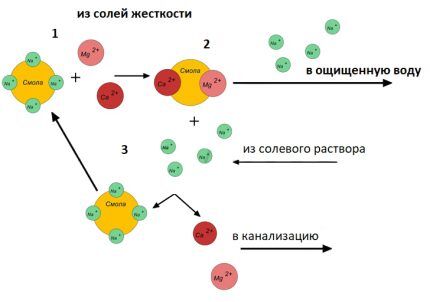
In order to replenish the contents of the ion exchanger, sodium salt is added to the “automatic dishwasher”. It is not for nothing that such salt compositions are also called regenerating or restorative. In fact, they are one of the mechanisms for extending the life of the heating element and the dishwasher as a whole.
All about salt products for PMM
Many manufacturers produce the salts in question and their packaging options. The main feature of such compositions is their high purity. They initially do not contain dyes, phosphates, chlorine and flavors, and consist almost entirely of pure sodium chloride.
Features of salt packaging
The sodium salt needed to soften water comes in the form of small colorless crystals.Many dishwasher detergents are sold in this powder form.
Their production technology is as follows:
- table rock salt is extracted (classical sodium + chlorine);
- the extracted material is purified from non-sodium mineral inclusions;
- This powder is packaged in bags for shipping to stores.
Everything is extremely simple. The main thing here is a high degree of purification. Any inclusions of anything other than sodium only cause harm. All other chemical elements in heated water themselves become a source of scale. That is why it is strictly not recommended to use food-grade iodized or sea salt for filling your car.
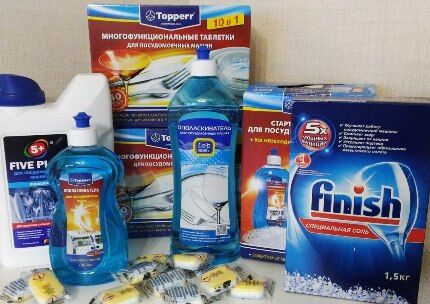
When choosing compressed tablets, in which, in addition to salt, “soap” is immediately added, special attention should be paid to the type of surfactants in the composition. It is best to take them with non-ionic (non-ionic) surfactants. They, unlike anionic analogues, are completely biodegradable and less aggressive.
Harm from impurities in regenerating salt
Sodium-based regenerating salts have been specially developed for dishwashers. They are needed for the correct, efficient and safe operation of this equipment. Such salts contain only NaCl, which we all widely use in cooking.
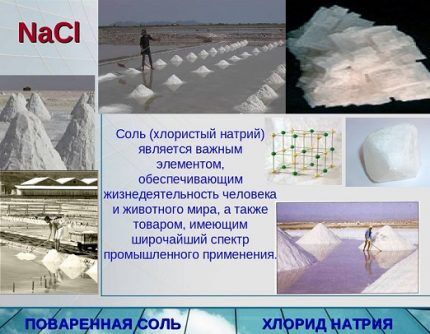
Only surfactants that are not washed off from the dishes with water during rinsing can pose a danger.But these substances are contained only in tablets with detergents. If tableted or powdered salt comes in its pure form, then the drug is absolutely safe. During the dishwashing process, it completely dissolves and is washed off into the drain without any residue.
Equipment manufacturers do not recommend using regular table salt for filling the ion exchanger in their instructions. However, if it is well purified and free of impurities, then use is quite possible. But it must be boiled. Before putting table salt in the dishwasher, you need to read very carefully what is written on the packaging with it.
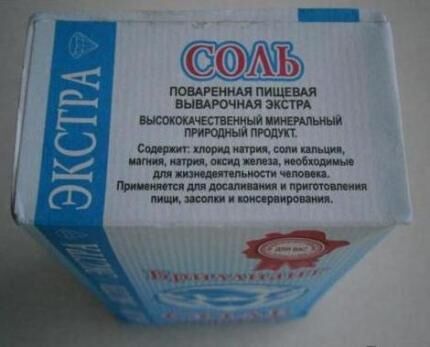
Sea salt with the iodine it contains is absolutely not suitable for replacement. In this case, the abundance of additional ingredients will only worsen the situation with scale. It is allowed to use only NaCl, purified from impurities by boiling. Only it will not harm the dishwasher and will soften the water properly.
It is not at all worth using other compounds and preparations from the range of household chemicals. They contain sodium salt in small proportions and always have many accompanying ingredients.
If “EXTRA” is selected for replacement, then it is recommended not to pour it into the ion exchanger, but to fill it in the form of a 1:1 water-salt solution. This will avoid the formation of a compressed lump inside. If it forms, then water will stop flowing into the ion filter and soften.
Dosage and nuances of use
The volume of salt required and the rate of its consumption in the PMM depend only on the hardness of the soapy water.The tougher it is, the more drug is consumed. Moreover, it is difficult to guess this indicator; it constantly changes depending on the season of the year and the means and technologies used by the water utility to clean the contents of water pipelines.
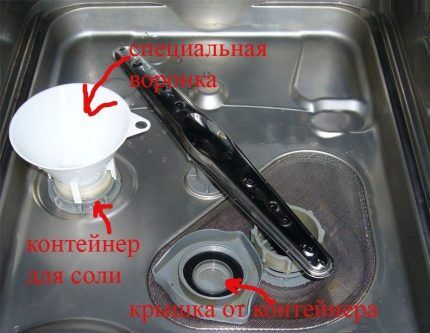
If your dishwasher is designed to use salt, it has one of two options:
- Water hardness sensor.
- Lever for manually setting this parameter.
The technology for using these devices is always described in the machine’s passport. It may differ depending on the model. It definitely won't hurt to read the instructions before turning on this washing equipment.
Most often, it is recommended to add anti-scale salt directly to the beginning of the wash. Moreover, often it needs to not only be poured, but also filled with water for better preliminary solubility.
The main attention should be paid to storing this product. Sodium salt is very hygroscopic; as it becomes saturated with moisture, it loses its effectiveness. It should be stored in a dry place and away from sunlight, otherwise the water will still remain hard as it was in the pipeline originally.
How to choose the right salt
Almost every manufacturer of dishwashers also produces salt and detergent compositions for them, or recommends directly in the instructions for the machine to use a salt version of a particular brand with a specific dosage.
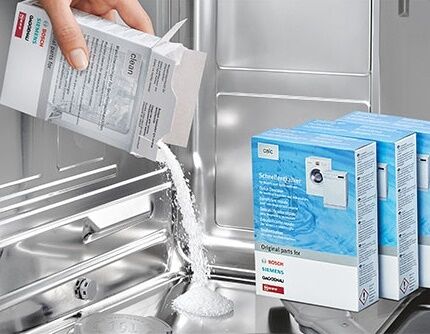
According to the standards, the product in question should not contain additives, rinsing aids, impurities or detergents. If anything similar is included in the description of the composition, then this is not an active salt for the ion exchanger, but a regular dishwashing detergent in an automatic dishwasher such as “3 in 1”, “5 in 1”, “ALL in 1”, etc. . Such tablets and powders are placed in a completely different compartment in the dishwasher.
The best option for regenerating salt is large NaCl crystals. The finely ground powdered analogue is used up too quickly; it is better to avoid it in the store. You need to look for a salt product in the form of granules with a minimum size of 4–6 mm. Tablets are also good in this regard, but not every ion exchanger can contain them simultaneously in the required quantity.
Conclusions and useful video on the topic
To simplify the selection of salt preparations for PMM, we offer a small selection with video materials. They describe in detail all the nuances of using salt.
What you need to know about salt compositions for automatic dishwashers:
The importance of using anti-scaling salt:
How can you replace branded salt for automatic PMM:
Anti-scale salt is a necessary and often mandatory condition for proper operation of the dishwasher. When purchasing such equipment, you must be prepared to constantly purchase consumables for it in the form of detergents and salt tablets or powders.Without the latter, scale will quickly begin to accumulate inside the PMM, which will inevitably lead to breakdown of the automatic dishwasher.
Do you still have questions about the use or advisability of purchasing and using salt for your dishwasher? Ask our experts below this article.
If you want to share your personal experience of using salt from a particular brand, write your opinion in the comments block, indicate the advantages and disadvantages of the product you have chosen, the form that is most convenient for you, and add unique photos of the packaging.



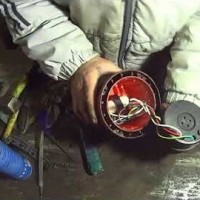
When we bought our first dishwasher, about 5 years ago, no one warned us that it needed salt. As a result, it did not last long, the heating element was covered, there was a large deposit of lime on it. We won’t allow this to happen with the new one; we bought dishwasher salt right away. Now, of course, Finish Calgonite is the most famous, but it is also the most expensive. We use others too, they do no worse, I liked the salt from Eonit. I have a question here, who knows: is it necessary to run the dishwasher from time to time with lemon or is there enough salt?
Evgeniya, salt and citric acid are chemical substances of different groups and they have different purposes. Salt is needed to soften hard water so that lime deposits do not appear on dishes and dishwasher elements.
Citric acid is used as “heavy artillery” in the fight against deposits, primarily fatty deposits. Salt must be used constantly. It can be used very sparingly, literally up to 500 grams. per year, if the water is soft and the PMM settings are set correctly. It is recommended to use citric acid every 1-3 months to remove fat and calcium deposits.By the way, instead of lemon juice, it is better to use specialized chemicals created for PMM.
You can read more about such tools in this article. These are the chemicals recommended by car manufacturers.
I also used Calgon for the dishwasher, but for me, the method with regular salt, dissolved 1:1, is probably more effective. Because I think that there are less chemicals and thus cleansing and rinsing is a more natural product. It’s not for nothing that our grandmothers brushed their teeth not with toothpaste, but with salt. It has been known since ancient times that salt kills bacteria, disinfects and removes plaque. If it's good for your teeth, it's definitely suitable for the dishwasher.
My wife and I are looking at buying a dishwasher, but this is the first time we’ve heard about salt. By the way, a question arose about boiling the salt. In what sense should it be boiled? How it's done?
Nikolay, dishwasher manufacturers strictly prohibit the use of regular table salt. Regular table salt contains impurities, including calcium salts, which are harmful to PMM pumps, filters and electronics. Specialized salt for PMM - 99% consists of sodium chloride NaCl. You can compare table salt and specialized salt with saline solution and ordinary water (saline solution is a solution of sodium chloride with distilled water). Evaporation of table salt will lead to a decrease in pure NaCl and an increase in the content of harmful impurities, because At high temperatures, lighter substances evaporate first. Sodium salts are always lighter than calcium salts (remember the periodic table - sodium is element 11, calcium is element 20).
Of course, if you use table salt 1-2 times, nothing will happen to the machine, but if you constantly add such salt, mineral deposits are guaranteed. Special salt for dishwashers costs a penny - from 70 rubles for 1.5 kg, so such dubious savings are an unacceptable option.
I use Finish All in 1 gel for my Indesit dishwasher. 1 tablespoon is enough for one wash, it's just cool! The dishwasher is very spacious and has been in service for more than 5 years.
I have been using regular table salt in my dishwasher for more than 10 years. Saved perhaps half the cost of the car during this time. Nothing is broken. Learn chemistry, gentlemen, and don’t be fooled by “special salt” for dishwashers, the composition of which is the same NaCl as in salt for 10 rubles.
Pour boiling water over ordinary salt and stir until completely dissolved. and drains from above. A sediment remains at the bottom of the dish, in the form of gray dirt, and it is thrown away. This is how we get pure boiled salt. You can also strain the solution to make it even more important, but I just let the sediment settle.
Hello. What happens if the dishwasher uses fairly soft water, but also adds a saline solution?
I bought PMM. Lots of questions. I read the comments. Porridge. They can do it, but they do it. It’s impossible, but they do it.
How much salt should you add and how often? Why can't you wash dishes with dishwashing gel? Is it possible to use baking soda? Thank you
You can wash with gel when the machine goes through the first cycle - RINSE from dirt, then open and add gel. But, you need to know when this happens.Watch the video on YouTube, where one guy installed a video camera in the dishwasher and describes all the cycles of its operation.
Complete nonsense! Dishwasher salt is the same as adding Calgon to the washing machine; it only speeds up the breakdown of equipment and wear of parts.
I don’t add anything to the washing machine (we’ve had it since 1996, that is, almost 25 years!!!!!!!!) or to the dishwasher. Only once every six months I run one cycle of washing and washing with anti-scale for washing equipment.
The dishwasher worked less (12 years), but the microcircuit flew, none of the mechanisms (!!!!!!!) were worn out during the entire period (!!!!!!!!!!!!). They changed it only because the repair of the microcircuit is comparable to a new machine, taking into account seasonal discounts. We also use the new machine without salt.
IMHO: salt and calgon were invented and are being imposed only so that washing machines and dishwashers are replaced more often and new ones are bought, because on the contrary, they accelerate the wear of parts!!!
People, use your brains!
Salt is needed if you have hard water, if faucets and kettles need to be washed once a week to remove white deposits. You can use regular coarse salt in the machine! Salt is also salt in Africa, even sea salt, which is 10 times more expensive than regular salt - exactly the same! It's all marketing! But tablets are naturally better, because... purified and concentrated.
Don't listen to those who haven't experienced this, they just have soft water!
Our machine simply refuses to turn on without salt, although the water is soft and there are no scales...
Hello. I've never had a dishwasher before. A dishwasher was installed a couple of months ago. What product should I use so as not to kill the equipment?